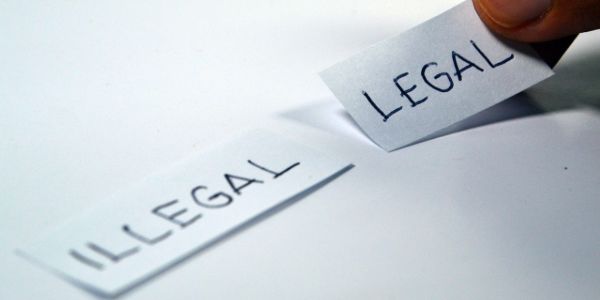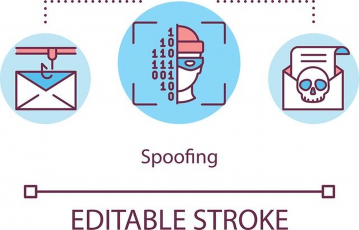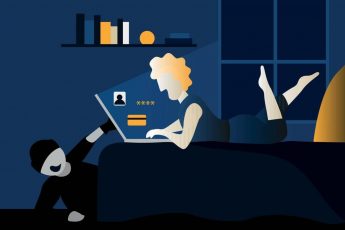You think you know too much about the internet, right? But how much do you know about the dark wonders of the internet? Probably that is why you’re on this page.
More like real life, the internet is so broad that it will take you a lifetime to traverse. In fact, even before you’re halfway done, a lot of content would have been added that you’ll need to start all over again.
We already know it, but how many are aware that the content you encounter on the web is merely the tip of the iceberg of information?
As per several studies, the hidden internet is so vast that it is impossible to know precisely how many pages or websites are active at the same time.
This web was once only the haunt of hackers, special forces, and criminals. However, thanks to new technologies, such as encryption and anonymity tools like a VPN or Tor browser, it is now possible to delve into it if desired.
So, are you looking to get into the dark web? Whichever your reasons are, you definitely need to learn how to access the dark web in an anonymous safely.
What is the Darknet, and how does it work
But what’s the dark web anyway?
Let’s start by pointing out the fact that what we can typically see online is about 4% of what the internet contains.
So, where is the rest of the content? On the deep web.
The deep web is simply the internet section that is not indexed by the search engines.
Therefore, it means that it can only be accessed with special anonymity tools like Freenet, I2P, and the famous The Onion Router (TOR) bundle.
Unfortunately, the deep web is usually confused with the dark web (I’ll explain the differences in a while).
Personal records/information and government documents are kept on the deep web as they’re not meant for public view.
However, still, they’re mostly connected to the internet as part of the information that forms an ecosystem for most surface web applications.
The deep web is often run on networks of private servers, which allows communication via specific means only.
Therefore, that way, it enables a top-notch degree of anonymity and makes it even difficult for authorities to shut down – a reason why most illegal activities take place on the dark web (a part of the deep web).
Even though Darknet is famous for hosting illegal activities, it is a safe haven for activists, journalists, and others who need to preserve their identity.
Dark Web vs. Deep Web
The deep web is that part of the internet that’s not indexed by the search engines.
It contains content such as user records, databases, some employee records, government files, bank details, and many more personal data.
On the contrary, the dark web refers to pages that, alongside being non-indexed, also involve illegal niches.
Notably, the dark web is a smaller section of the deep web, but it’s actually what most individuals refer to when addressing the “bad part of the internet.”
It’s the dark web where the “bad” stuff primarily resides; think about the drug dealers, hitmen, black hat hackers, and human traffickers.
Most folks favor the dark web because of its ability to render anything or anyone invisible. The core values of the Darknet are basically privacy and anonymity.
Imagine the internet as an ocean. The majority of people just surf the surface and catch the gigantic waves floating in their path.
Browsing Facebook, checking emails, streaming videos, and shopping takes place here, outdoors. If you find it via a search engine like Bing or Google, it is a component of the surface web.
Dive under the waves, and you will get to the muddy waters of the deep web. The content of the deep web is not indexed by search engines, which makes it trickier. The majority of this content is not illegal or malicious, though.
Stuff like membership pages protected by login screens, internal company websites, or private servers is part of the deep web. They all are present online, but search engines can’t locate them, taking them one step underneath the surface to the deep web.
It is on the dark web that things get fascinating. Dark web content is hidden from search engines and cannot be found by conventional means like the deep web.
The main difference is that websites on the dark web are purposely difficult to find (and mostly illegal), which allows them to hide data or act as centers of banned activity.
Counterfeit goods, black markets, weapons traffickers, and drugs can be found on the dark web, but only if you know precisely where to look.
What does the dark web boast
Now, you might be wondering, what’s on the dark web?

Privacy and anonymity are the core values of the dark web, and it hosts both harmless activities and criminal content.
While some dark web websites may contain such content as complex riddles or some eBooks, one thing will always remain; the dark web is for dark material.
It means that the dark web contains illegal alongside disturbing content. Some of the foul stuff that you can find on the dark web includes:
Illicit substances
On the dark web, you’re expected to find illegal and prescription drugs (including Marijuana). Also, some toxic chemicals are peddled on the dark web that may cause severe damages to the targets.
Stolen information and fake IDs
Whenever a data breach occurs, it’s very much likely that the information will end up on the dark web for sale.
The information can be of any kind, either social security numbers or even bank card numbers (the bank/credit card information is usually sold in bulk).
Moreover, it’s on the dark web that you can purchase things like hacked Netflix accounts, login credentials, and much more.
Interestingly, darknet sites also offer stolen documents and passports from around the globe. For example, you could find a passport from a UK citizen there for under a million dollars.
Dangerous and disturbing services and items
A lot of things that you think are dangerous for a second can be found on the dark web.
One can buy anything on the dark web with the right price, including stuff like counterfeit goods, mercenaries for hire, child pornography, and body parts. Also, human trafficking businesses are run on the dark web.
Basically, you can get your hands on about anything on the dark web, including some things that you’d better not imagine.
Mostly on the dark web, financial transactions happen via cryptocurrencies such as Bitcoin, making it possible for parties to do business anonymously.
Uranium
In a world where almost everything can be bought, it is no surprise that uranium ore can be processed into weapons can also be obtained from the Darknet.
Weapons
As you might have got an idea by now, almost everything criminals are after can be found on the Darknet.
Among other things, some darknet sites offer explosives.
Alongside C4 plastic explosives, one can also purchase rocket launchers and numerous other weapons on the Darknet without much trouble.
Hitman
People can contact assassins on the dark web that are ready to kill for money. However, researchers believe most of them could only be scams.
Deadly Poison
Not too long ago, the case of a young man becoming wealthy by producing and selling ricin hit the headlines in the United States.
Ricin is a protein obtained from a milkweed plant that kills human cells in a short time and is lethal even in tiny amounts. Almost all such deadly poisons are said to be available for sale on the dark web.
In 2015, a computer programmer named Mohammed Ali was jailed for eight years after he tried to buy ricin poison from the Darknet. The guy reportedly got inspired by the hit US TV series Breaking Bad.
The story hints at why taking dark web safety measures are essential even if you are jumping into the dark side of the internet only because of some curiosity.
Fake university certificates
For a long time now, the Darknet has already been famous for fake university and college certificates.
Malware and viruses
Almost all sorts of computer viruses and malware get spread from the dark web, so it is needless to say that they are very commonly available on it.
Why do the Darknet and deep web exist in the world
The deep and dark webs seem like illegal places that you should not visit. But why do they exist in the first place?
It is worth noting that it’s not always that the dark web is illegal as there’re a lot of activities that take place on the dark web that are within the law.
Talking about the fundamentals, the dark web and the Darknet only guarantee a higher degree of privacy and anonymity.
Information on the dark web is not meant for public consumption, and the dark web, therefore, protects personal data intended to be private.
It means that whatever you do on the dark web is entirely your business, and if you take certain dark web safety precautions, anything you do won’t be tracked or even traced to you.
Given the dark web and dark net’s anonymity principle, individuals can express themselves on unpopular issues but within the law. Talk about the whistleblowers, bloggers, and many others.
The anonymity of the Darknet is mainly attractive for 2 groups: In the first group, some populaces require the security of the deep web for day-to-day communication.
They exchange sensitive information and data and, at times, have to risk their lives or that of their informant if they don’t share data under the safety of the deep web.
Such people can be opposition figures from dictatorship-led countries, the politically oppressed guys, whistleblowers, or journalists.
The other group of people is the one that requires the secrecy of the deep web to avoid pessimistic consequences – and to avoid trials. This group consists of a populace whose actions on the internet would rapidly lead to imprisonment or fines.
The legality of accessing the dark web

The dark web sounds exotic, with a thrill of the unknown and unexplored. Similar to the deep blue sea, most dangers are hidden.
Fortunately, it’s not a criminal offense if you simply search the dark web, but if you use it to carry out some illegal activities, then you get in trouble.
As much as the Darknet contains even the “good” stuff, it’s not a place that you need to stumble about blindly without proper dark web safety.
In a nutshell, the deep web in itself is not illegal as it’s a network for privacy and security-conscious people.
However, it’s illegal if you venture into the dark web to commit some unlawful actions such as downloading child porn, buying fake documents, drugs, credits card, and more.
The dark web has several convenient uses, which are not all basic.
People who live under a government that deeply supervises or censors internet traffic eventually get attracted to the dark web.
Why? I hear you ask. Because it allows them to see news from the rest of the world or even order supplies that they cannot get in their country.
Journalists and whistleblowers also use the dark web to communicate without revealing their location or private contact information.
To give you a better idea, here are a few constructive uses of the dark web:
For using the internet anonymously
You will no doubt be surprised to learn that the Darknet hosts a large number of websites similar to those you will find on the surface web (the visible/common internet we use).
Such sites include blogs, gaming sites, social media, and super-encrypted email platforms.
Buy items that are difficult to get otherwise
Some common pain relievers and sleeping pills available in the EU are illegal in various Middle East and Asia countries. The dark web comes to the rescue in such cases.
Many turn to the dark to grab such medications with its private and secure networks.
Purchase legal goods secretly
DarkWeb “marketplaces” guarantee confidentiality and anti-surveillance for your online purchases that you simply won’t find on any other websites.
Swap data in countries that censor the internet
Many countries, such as Qatar, China, Cuba, Russia, and Turkey, censor internet contents that promote political dissent. The Darknet offers a place of free expression where not even a chunk of these limitations exists.
Revealing the abuse of authority
The dark web allows the political activists and media persons to report stories that may cause them problems with governments or dictatorial regimes, seeking to infringe on a person’s right to confidentiality.
Dark web safety: How to access the Darknet and deep web securely
First, most of the content on the dark web is highly illegal, and no matter the precautions are taken to stay anonymous, you should be aware that you enter the dark web world at your own risk.
Whatever your reasons for entering the dark web are, you have to follow some crucial steps to ensure your dark web safety so that you access it in an entirely safe as well as anonymous way. Below you go with the steps to take:
1. Install Tor browser
As a rule of thumb on the dark web, you should never use a default browser to search for anything on the deep web.
Popular browsers such as Opera, Firefox, or Chrome have a tracking technology that can make you visible on the authorities’ radar.
Therefore, you need to make use of the Tor browser, which, by far, is not only the safest onion browser but also is easy-to-use.
Related Reading: Best Private Internet Browsers
Some people would argue about its reliability as they claim that it’s watched, but you make sure to download the Tor browser from its official website only and nowhere else so that your computer doesn’t get any spyware or malware.
The browser is free to download and use. Also, ensure that you always keep it up-to-date to ensure that you’re not left vulnerable to any security issues.
2. Use a VPN
Using a VPN is a must if you wish to access the dark web safely. A VPN encrypts your web traffic to ensure that it’s hidden from the big brother who could be watching you online.
Even if you’re already using the Tor browser, still, your traffic could be traced back to you by someone with the know-how and enough time, such as the FBI.
Therefore, before messing yourself about on the dark web, you should do yourself a favor by getting your hands on a quality VPN like ExpressVPN.
3. Install TAILS
When accessing the dark web, the last thing you want is to leave traces behind that could be traced to you.
The best way to clear the traces is by installing the Amnesic Incognito Live System (TAILS) – a unique Debian-based version of Linux that removes the user activity on the computer.
TAILS will never save cookies or a file to the hard drive without your consent. Also, you won’t run the risk of browsers dumping the famous “page out” data onto the disk.
Moreover, it comes with an already pre-installed Tor Browser so that once you’re up and running, you won’t have to worry about any extra steps.
It also has inbuilt productivity tools such as a processor as well as an email client, which means once you’ve got TAILS installed, you can do much more than just browsing the web safely.
4. Take extra security precautions
One thing is for sure, the dark web is full of individuals that you definitely don’t want to come across.
Unfortunately, at some point, due to the nature of the dark web, you’ll probably encounter them.
Therefore, all you need to do is to take security precautions, such as making yourself as much a small target as possible by reducing the number of areas that they may use to attack you.
For instance, before opening the Tor browser, ensure that all the other apps on your computer are closed, you should stop some unnecessary services from running, and also always cover the webcam with a piece of paper or tape.
5. Go only with cryptocurrencies for transactions
Anything can be bought in the dark web for a price.
Therefore, if you’re to purchase anything, ensure that under no circumstance, you should use anything apart from a cryptocurrency.
Even if the seller accepts regular payment means, you should always opt for going with crypto payments while transacting on the dark web. The same goes for the sellers, never use the regular payment means for dark web transactions.
So, one thing you should never forget is to not use your credit and debit cards for purchases on the dark web. You should always use anonymous crypto wallets or simply stay away from the dark webshops.
The world’s most commonly used cryptocurrency is Bitcoin which you may be tempted to use due to its anonymity.
However, there’re possibilities that someone can still link the personal details to a transaction as a result of the issues like connected nodes, address reuse, and blockchain analytics.
Therefore, to ensure that you stay anonymous on the dark web, you can use Bitcoin mixers (also known as cryptocurrency tumblers), or you can opt for a privacy-focused coin such as Zcash and Monero.
6. Know where you’ll visit
Unlike the clear/surface web where Google and safe search engines index all the relevant search results and present only the best to the users, the dark web doesn’t have that luxury.
It means that it can be overwhelming to get what you’re looking for, and as a result, it’s very easy to stumble into a place you could never want to be.
The best thing to do is to get your hands on some good darknet directories to find out the safe pages regarding the stuff you want to search. The dark web itself has a lot of dark web site directories to help you point out where you need to go.
It should rather be a rule of the dark web that you should stick your nose only where it belongs. Things can quickly turn ugly on the dark web as some channels are watched; therefore, if you feel that a website is fishy, just close it and move fast.
7. Close everything once done
Some folks have been cautious enough when browsing the dark web only to fumble at the last minute once they are done – they just get too lazy not to close everything.
For your optimum dark web safety, you should ensure that once you’re done browsing the Darknet, shut all the browser windows as well as any other content that could be connected.
For instance, if you used TAILS, you should shut your operating system down and reboot back into the usual interface. In case you used macOS or Windows, you should ensure that you restart your computer.
Tor over VPN vs. VPN over Tor
It is never wise to visit the dark web without either a VPN or Tor.
But, which is better than the other? That’s the question that most folks ask each time they want to jump into the dark world of the internet.

While the two are similar, a VPN emphasizes privacy, and Tor emphasizes anonymity.
On its line, a VPN provides encryption to all your internet traffic that travels to (and from) your device and then route it via a server in your preferred location.
Therefore, when combined with TOR, it adds security as well as anonymity.
So, what about Tor over Virtual Private Network (VPN)?
When you connect to a VPN and then fire up your Tor Browser, you are using Tor over VPN, which is the most commonly used method by far.
The internet traffic travels to the VPN server first and then bounces into Tor (The Onion Router) network before getting to its destination.
It means that the ISP or any other big brother online will only see the encrypted traffic of VPN but won’t recognize you using Tor.
All you need to do is to have a trustable VPN provider when using Tor over VPN, as the provider can store metadata logs even if it doesn’t see your explored content.
You should choose a VPN that doesn’t store your logs (both traffic and session), preferably ExpressVPN or NordVPN.
Tor over VPN doesn’t protect you from the malicious Tor exit nodes (a final relay before the traffic gets into the destination website) as Tor nodes are merely made of volunteers, most of which don’t play by the rules.
The exit node decrypts traffic, meaning it can steal personal data or even inject some malicious code. Also, usually, Tor exit nodes get blocked by most websites that do not trust them, plus, unfortunately, Tor over VPN has no power about that.
What about VPN over Tor?
VPN over Tor is less popular than Tor over VPN, and in fact, only two VPNs ((BolehVPN and AirVPN) offer the service, although none of them is good in terms of speed.
In VPN over Tor, your internet traffic moves through Tor (The Onion Router) network first and then via the VPN. Therefore, it means that your VPN provider has no access to your IP address, but VPN offers protection against the bad exit nodes.
Unfortunately, with this option, your ISP will see that you’re using Tor, which understandably makes it not the recommended pick among the two (Tor over VPN and VPN over Tor).
In VPN over Tor, your trust should be in your Internet Service Provider and not the VPN provider.
Some will consider it more secure as they think they can take action against their ISPs better should anything goes wrong.
However, experts recommend Tor over VPN for best-possible dark web safety.
Watch out; your ISP could see you using the Tor
The internet providers, as well as websites, can still see that you’re using Tor as Tor node IPs are public.
While a website can’t identify you or an ISP can’t decrypt your internet traffic; still, they can see you using the Tor, which can draw some unwanted attention and raise suspicions.
Tor Bridges or a VPN will help you to use Tor privately as your ISP (Internet Service Provider) will not see that you’re connected to a Tor node.
So, if you aspire to use Tor privately, you can use VPN or Tor gateways (Tor nodes that are not publicly indexed).
Setting up Tor Bridges is merely extra work, and you would need some IT knowledge for it, too.
So it is always better to just subscribe to a VPN like ExpressVPN and use it with Tor (remember to connect to your VPN first and then turn Tor on).
What can my ISP see?
Your Internet service provider, or ISP, is your gateway to the internet. Everything you do online goes through your ISP.
It means unless you use a VPN that encrypts your internet traffic, they receive all information about you and your digital life all the time.
When your online data is not encrypted, your Internet Service Provider will see everything. Your ISP sees what websites you visit, what you do on social networks, your emails, and so on.
Sometimes they even know more than you would like about private matters, such as your health or your finances.
With all this data, your ISP could create a very accurate profile of you and link it to your IP address. This is one of the reasons why it is always good to hide your IP address.
Subsequently, most countries have laws on data retention. These laws mark how long ISPs must save the data they collect.
Such legislations differ by country: in some places, the period is six months; in others, it is at least one year.
During that period, on top of the risk of accidental disclosure and theft, governments and the police could ask ISPs to share data.
If that happens, you can guess what happens to your data then. It is likely to differ by each provider and, again, by country. However, it is often prohibited for ISPs to sell your data to third parties.
Notably, the encrypted data, such as WhatsApp messages, are secured behind end-to-end encryption and hence are not visible to your ISP.
If you live in the EU and want to know what data your provider has collected about you, the GDPR gives you the right to request a full report.
Popular dark web criminal cases

Deep down, the tip of the iceberg is where over 90% of the internet content is, and as much as the dark web is supposed to be used to promote free speech alongside bypassing censorship, a lot of shady activities take place there.
A lot of high-profile stories have shown up as a result of the press focusing on the dark web, and in recent years, several criminal cases have been thrown into the table. Some of them include:
The Playpen Case
The child pornography site Playpen is one of the famous scenarios that resulted from the dark web. The site had only been up and running for about seven months, but surprisingly, it gained over 215,000 users.
Then a law enforcement agency (still unidentified) provided information to the FBI that later accessed the site’s host server.
The FBI didn’t shut the site down either but hosted it for about two weeks, during which they captured over 1,300 IP addresses of site visitors that led to over 900 users being arrested, including the creator of the site, Steven Chase.
Silk Road
It all began as an invention of the libertarian idealist who was looking to sell home-grown mushrooms for Bitcoin.
He ended up with over 1.2 billion dollars worth of several deals that involved firearms, drugs, counterfeit cash, hacker tools, and hits.
Unfortunately for him, the site’s creator, Ross Ulbricht, was caught after promoting Silk Road on a regular website using his actual email address.
AlphaBay
Just after Silk Road was shut down, AlphaBay became the major marketplace on the dark web.
After its founder Alexandre Cazes used the real email address on the site for communications, reused the same pseudonym on and off the dark web, and kept various unencrypted crypto wallets always open, AlphaBay was shuttered in 2017.
A series of security missteps had led to the closer to the extent that even when the cops busted into him, he was logged into the site as “admin.” Days after the arrest, he was found dead in his cell, allegedly having committed suicide.
The Ashley Madison Case
The dating site Ashley Madison was busted by a hacker group and the impact team in 2015, whereby the hackers threatened to release the personal information of the users unless the site, and its sister site, Established Men, were closed.
Since their deadline wasn’t met for the closer of the sites a month later, the Impact team ascended to the dark web, where they started to publish the data.
Over 32 million IP addresses of members were released, including that of the CEO of the site, with hacker claiming that the site had obliged its primary purpose and that they were forcing members to pay to get their accounts deleted from the site.
Your data can end up landing anywhere
Ever since events like Wikileaks and informants such as Edward Snowden have revealed that several authorized institutions are frequently spying on citizens worldwide, privacy has become an often discussed topic.
As a matter of the fact, your data could be anywhere on the internet, meaning it could already be at the three internet levels (surface web, deep web, and dark web).
The chances are that you already have a presence on the clear web (the surface web), be it a LinkedIn profile, social media, Facebook, or any community involvement.
Also, your data is more likely on the deep internet in one way or the other. But you have to keep your fingers crossed that it remains there and hope the party holding your data (be it the school or hospital records department) is keeping it according to the GDPR standards.
Another channel that has fueled the growth of the deep web in the cloud. For instance, if a cloud storage firm like Dropbox gets its files on the Amazon web server, it means that your data is already placed on the deep web.
It should not be a privacy issue unless the company gets hacked or your data is exposed accidentally.
Keep in mind, at any given time; you could be followed online by different groups and things such as:
- Internet service providers (ISP)
- Operating systems
- Your network administrator (Wi-Fi)
- Internet browser
- Apps
- Hackers
- Websites
- Governments
More dark web safety tips
By now, you should be aware of how you can access the dark web safely and anonymously using a VPN and the Tor Browser.
But still, there’re some other tips you can employ to bolster your dark web security once you commence your journey into the Darknet. Below, I will list them for you:
Adjust the Tor security setting
Tor provides you with an inbuilt slider to let you tweak the security levels. You only need to click on the onion icon and then choose Security Settings.
You can then adjust the slider to a point when the cursor points to the safest, meaning that the JavaScript will be disabled on all websites you visit by default.
Please note some images and symbols might not display after you set your Tor security setting to the safest.
Rescale or minimize the Tor browsing window
Something that most people aren’t aware of is that you can be tracked depending on your active window’s dimensions.
Therefore, as much as it’s a tip that sounds rather off, you should ensure that you minimize your Tor window before you proceed.
Shut down Tails
Don’t make mistakes at the tail-end of your surfing the dark web by forgetting to close the tails.
Always remember to shut down the tails because once they get shut, the OS, for instance, will wipe itself from the thumb drive that you’ve installed it.
Conclusion
Browsing the dark web is not illegal in most countries. However, it could make you look suspicious in the eyes of the police.
Most of the things sold on the dark web are illegal, so obviously, it is forbidden to buy those illicit items.
Since these products are usually only found on the dark web, anyone browsing this part of the internet could buy them. This is why governments could try to monitor you if you visit the dark web.
Understandably, this dark and unregulated part of the internet is the perfect place for illegal activities. It is widely used by criminals; it is ideal for drug businesses and arms dealers; these are why it is rightfully called the dark web.
Besides, research has confirmed that terrorists use the dark web to communicate, recruit new members, and plot attacks. So, in short, even if you are not a law-abiding citizen, it may not be the best place you want to be.
But, given that over 90% of content lies on the dark web, it’s a no-brainer why you may be tempted to access it.
If you wish so, all you need is to follow the dark web safety tips that I provided above, and you’ll sail your way into the dark web safely, securely, and anonymously.
On the final note, the dark web is a free world that you can enjoy to the fullest only if you do it responsibly, given that offensive material is always a click away.
Images via Pixabay.






